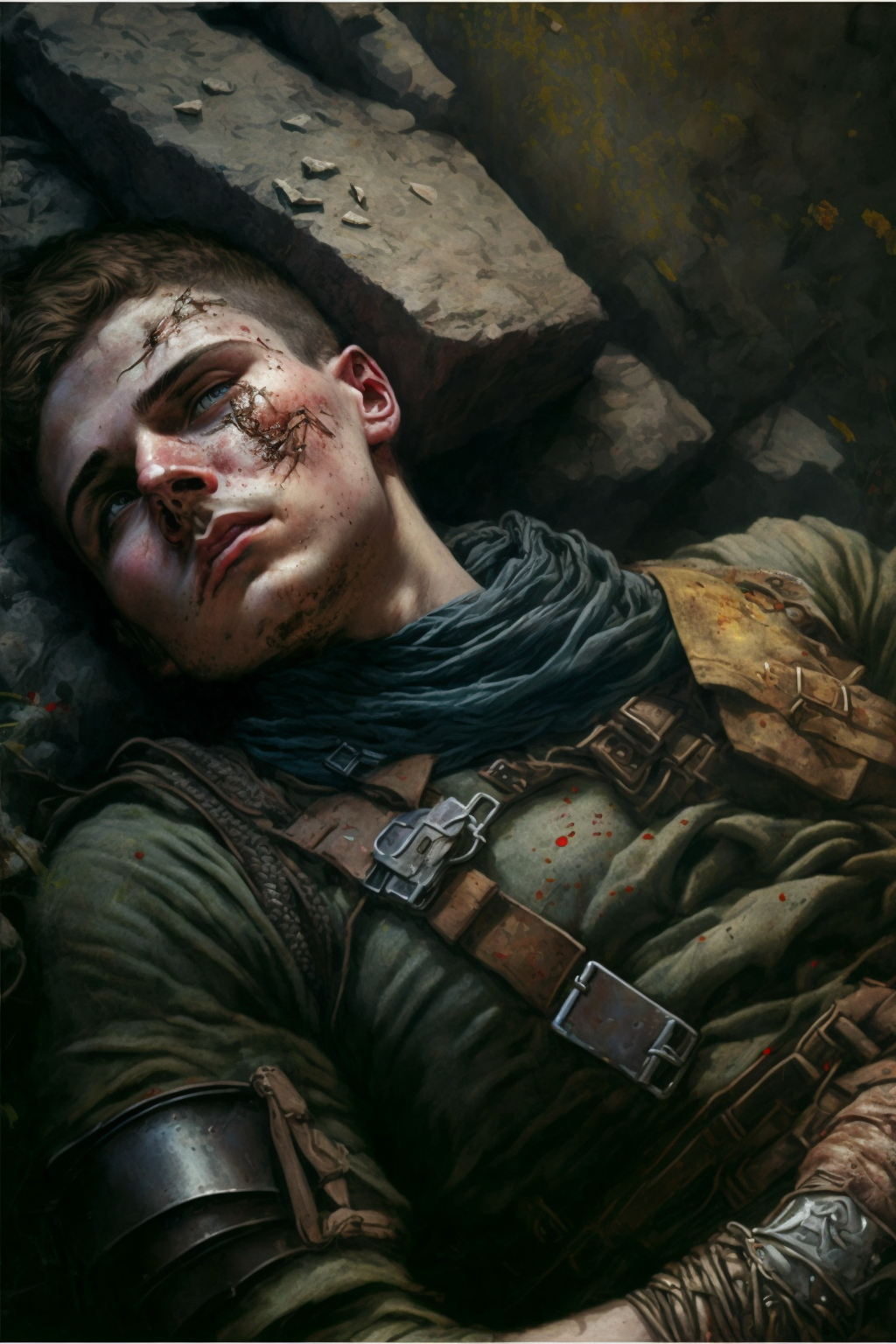DM Tips for Better roleplay



Handing out Secrets
Handing out secrets to the players at the beginning of a campaign or at a new phase in a campaign is a fantastic way to create layers of complexity. When characters don’t all have the same motivations, there is tension that leads to drama and great roleplay. Consider secrets such as the following:
- Secret connections—the more dubious the better, such a family running a crime syndicate, or a relative being a famous criminal or ruthless potentate
- Debts—personal, financial, infernal, perceived or otherwise
- Prophecies—go to town with this. Prophecies, dreams—it’s all fair game in fantasy.
- Familial obligations – children, needy/elderly parents
- Patrons with expectations such as the character marrying their (yucky/simpering) heir
- Business entanglements such as needing to be at a certain place to sign for a shipment or they forfeit it.
- Ulterior motives—a double agent? Under threat to deliver intelligence? On the run from creditors. Collecting on a family debt. Out to prove to their parents that they are worthy of an inheritance.
- Wanted for a crime—perhaps a crime they didn’t commit! Perhaps a very embarrassing crime! Perhaps a crime the victim deserved.
- False identity—you are not who you say you are. A runaway from a rich household eager to escape the clutches of controlling parents?
- Former life as a vigilante, priest, servant, slaver
- Curses
- Illnesses (even terminal conditions)
- Personal goal
- Secret Vows
- Relationship complications—especially with deadlines
- Organizational complications/expectations—especially with deadlines
- Scars or tokens of a former allegiance/relationship, especially ones recognizable by NPCs.
Fixing Common Mishaps
Here are suggestions for solving some of the most-common roleplay-inhibiting situations.
Metagaming
Metagaming, especially players telling other players what to do, is the enemy of authentic roleplaying. Try giving out inspiration to players who catch others metagaming. Then you don't have to be the bad guy.
Out of character
Some players, especially new ones, explain what their character does and says, rather than speak it out. When this happens, try asking:
“I am curious how Evelion the high elf would express that?”
Or, “Let’s give Gamlin (or whatever their character's name is) a chance to explain in person.”
Wallflowers
When a few players are monopolizing the conversation, address a less-talkative player and ask “What is (character’s name) thinking or worried about right now?”
Playing themselves
When a player is acting like themself rather than the character they've designed, trying reminding them: “How would Raging Rufus approach this situation?”
Analysis paralysis
When a player seems conflicted by what to do, try asking:
“What would Brimble Buckhaven do?”
“Is Kiela someone who would think or just act on instinct?”
“What do Harken's instincts tell him?”
No Deliberation
Some players are quick to act and can shortcut fruitful preparation and group negotiation, by interrupting table discussion and rolepay with hasty action, "My character walks up to the guard and hands them 10 gold pieces and asks to be let through." If this gets to be a problem, try asking a more reserved player what their character is most worried about and whether they would voice any concerns, or intervene, as player X attempts to do this.



Don't-miss Opportunities
At every session there are so many chances for roleplay, but they often seem to slip by. Try these suggestions for capturing those magic moments that payout in powerful emotions.
Moments of repose.
When characters are around the campfire, or in the tavern, or taking a short rest, especially after a battle, a dangerous challenge, or a mission, ask:
“What is Elaina missing most right now?”
“Who is Draxis thinking about right now?”
“What is Valrath doing to pass the time?”
Interacting with NPCs and reminiscing
Have NPCs be curious about the characters. Ask about clothing, scars, coinage, appearance, how the players met, about a recent adventure, about whether rumors they've heard (funny ones) about the characters are true, or about what sort of life they left behind or what it is like to be an adventurer.
Let shopkeeper be more curious about the adventurers than they are interested in selling stuff. Have young kids in town ask about their magic items. A child could be wish they had a healing potion to heal their mother.
Roleplaying the action
Instead of telling the player that they get hit or the attack misses, tell the dice roll (for example an 18 to hit with a greatsword) and describe the incoming attack at Sir Ravenbeard and ask, “what happens?” You are gearing toward answers like, “I see the blade coming and cross swords, deflecting the blade at the last minute—my AC is 19. That's a miss.” When a player fails their save, ask why they failed the save, or what happens to (character name)?
Battlefield Banter
When baddies or BBEG’s get hit, let them respond in character. “How do you hit so hard? You're tiny.” Or lob insults like “You fight like bratty little kid.” “Shooting from the shadows like a coward! Where is your honor? Face me one on one.”
Monologue or make threats. Attempt to monologue between attacks of player with extra attack, inviting the other player to retort before answering with steel, “Your puny resistance will never stand. When our commander hears about what you’ve...” This begs an in-kind response.
Death throes.
When a creature has been slain, pause combat to give it its last words. What does it say before dying? Who does it speak it? Invite the player to respond in character. “What do you think this accomplishes?” “Was it worth it?” “Will you remember me?” “Did I fight well enough to enter the halls of Valhalla/fields of Elysium?” Does the creature reveal a secret of the enemy or regrets. Perhaps a dying NPC reaches out to a player and begs them to take something to their kin, or swear a promise.
Death saves
When a player drops to 0 HP, let them describe the wound. “You take 12 points of piercing damage.” “I’m down!” [not interesting] “What does (character’s name) see as they look down at the wound?” “Lady Evoniastus looks down to see a black arrow sticking out of her chest, blood gushing in spurts. She looks up at her allies, her face seeming to say only, “I’m sorry.” Then she falls.” [very interesting] Or something like, “What does Gortan say to his friends as the blackness closes in?” “Gortan coughs up blood A good day to die. *Then he laughs, choking on his own blood. He falls silent.” Potentially invite players to describe regrets or unspoken secrets, unfulfilled dreams ("I should like to see Montana", etc.) Offer them a chance to speak a few words as their life bleeds away, especially if they failed their last death saving throw.
Time-slowing in Combat
Authors and movie directors use time-slowing at dramatic moments. You can, too.
When you've got a big attack such as a dragon’s breath weapon, describe the immensity and intensity of the attack and how it is affecting the environment and NPCs, roll damage, then ask the players, one by one, to make their saving throw and describe what happens to their characters. Players can then describe how they attempt to dodge and how they are injured.



Describe the aftermath of a devastating attack such as a fireball—slow the action. Describe the flames rising, the smoke in the air, the reduced visibility, scalding flesh, the smell of burnt hair, hazy vision, and the laughing cry of the victorious villain.
Suffering Conditions
After a player suffers a condition such as prone, paralyzed or charmed, go in-character to find out what it is like. With luck and coaching, when you say, "The devastating tail swipe hits. You fall prone," you can get responses from players like, “Joselyn blinks, her breath stuck in her chest. She's lying on her back, her eyes brimming with tears as her enemies are closing in.""
If a player has just become paralyzed or restrained, ask:
“What is Artemys thinking?”
"Emily, take us into Elasriel's feelings as the paralysis turns her muscles rigid."
“What would Calan say, if only he could talk?”
Or ask, “what is Praxim dreading most?” It might be losing an ally, or dying themselves. But we don't know unless the player tells us!
Use Stress Effects!
To make the aftereffects of battle, injuries and the terror of adventuring more evident and effectual in roleplaying try adding stress checks, as described in the resources DM's Guide to Better Roleplay through Stress Effects which shows how to incorporate the stressed condition in skill checks and battles with such effects as embarrassment, anger, anxiety, panicked, hopeless, guilt-ridden, irrational, paranoid and selfish.
Create Moments like Film Director
How do movie directions create character-building moments?
-
Queue up 1v1 conversations between players such as moments of repose. Ask a player what a character is doing to cope. Are they alone, or away from the group? Then turn to another player and tell them “you notice (other character’s name) isn’t around. What does your character do? Or, “what does your character say when they find (other character) standing alone?”
-
Queue up arguments, especially after something does not go well such as something lost, stolen, or used up (create shortages to create conflict), such as running out of food because a pack fell from the edge of a cliff after a failed Athletics check. Remember, you do not always have to assess a hit point penalty when a character fails a check. Just give them a setback. If losing supplies is the more consequential of the two, go with it! Then let them blame each other. “What does (other character) say as they watch the pack with the food tumbling into the bottomless abyss?” Or, "Whom does your character blame for this? How does (other character) respond to that?""
-
Queue up rivalries, especially for romantic interest NPCs. Often one player will “go after” an NPC after they are introduced/described by the DM. Have the NPC look from one to the other indecisively, then leave the room, allowing the players to duke it out. Seed the argument with questions like, “why is your character a better match? What do they say about it?”
-
Queue up competitive spirit before a battle, especially if it risk being a routine, or below-level goon fight. “Who is going to defeat the most enemies? Is there a wager?
Leaking secrets
Seed players with secrets like a scar or a token or symbol of a membership in a dangerous or hated group, and when they fail a skill check, describe that becoming visible, or falling out of their pocket. Ask how they react. Ask other players how they react. Introduce NPCs that know a character. Bring in a parent, sibling, old roommate, ex-spouse, etc. who knows things about the character and tells an embarrassing story (which may or may not be true)
Give the players something to protect that evokes emotion and potentially creates skill checks.
- A young NPC, for instance, who is protecting something very important.
- A wounded animal
- A wounded NPC.
Get the reactions first!
Fish for emotional reactions before you roll initiative or before a big spell or effect hits, "Before you do anything, I'd like to know what (character) feels in the moment the (monster) emerges from the flame." Or, "In the instant before the dragon's flame reaches you, what are you thinking? What are you wishing? What would you say?" This gives the others time to think about what they will do.



Stuff breaks
When PCs fail skill checks, you don’t necessarily have to simply assign damage. You can have something break, or fail instead. “You reach for ledge, pulling yourself upwards. That’s when you hear the crack. The rock shifts under your fingers and peels away, falling to the ground 50 ft. below. How will you climb to the next level now?” The character didn’t fail. The rock did.
A rope could break, a piton come dislodged, a bootlace snap—anything. But with broken objects, players have near-term task to solve in getting that fixed, which often involves roleplay and problem solving. This is far more interesting than taking fall damage.
Break a pack strap, a rope, a weapon, a piece of clothing or armor (allow their AC to change temporarily until they can get it fixed), a boat starts leaking, a wagon axle breaks, etc. Then let the team talk about what they think should be done.
Weather the Storm
Interrupt regular progress on the trail with something that causes the team to stop such as blinding snow, drenching rain, strong winds, etc. Ask the players what they do to weather the elements. Then in those sheltered moments, create repose by inviting thoughts. Repose questions
- What is (character’s name) remembering now?
- What is (character’s name) missing most?
- Who is (character’s name) thinking about?
- What is (character’s name) regretting?
- What is (character’s name) planning?
- What does (character’s name) wish they had right now?
Then, when players start to answer (typically out of character) ask “how does (character’s name) express/share that?”
Slot In Repose in your Session
Less is often more in a D&D session.
If you find sessions turning into murder hobo excursions, plan moments of repose.
- Ask a player how their character looks right now.
- After a battle or a skill check, or before a night on the town, let players describe their character. Then tell another player that they notice how this character looks and ask what they say/do?
Body Language Cues
Invite roleplay with open-ended body language. The player will be encouraged to respond in-kind or with dialogue.
“The kitchen maid gives a faint smile and leans against the wall, her eyes meet yours….” If they don’t take the bait, ask what the character is thinking/feeling. Then invite a response. “What does (your character’s) body language say?”
Make the players do the work.
What does this NPC see?
When a new NPC enters a scene, invite the players to describe what the NPC sees, allowing them a chance to describe their character’s present appearance. This could happen, for instance when the players come down for breakfast, or when someone walks into their room or their campsite, or when the PC’s enter a room with NPCs already engaged in a meeting or other pursuits are interrupted.
The Reflection
Another (admittedly cheesy) method eschewed by editors but universally loved by readers is the “looking in the mirror” trope. Tell the player they see themselves in the mirror or a lake for the first time in a long while. What do they see? What has changed? Is there something hiding behind their eyes or clouding their countenance or conscience?
Heroic Pose
After some villain monologuing, or upon entering a new scene, call for a heroic pose to allow players at the table to act out their character’s stance. This is fun.
Scenery Change
A change of scenery gives PCs a chance to dive into details of the setting. Provide “show off” scenes at interludes in a journey. After describing an setting scene such as a waterfall, a sun-dapled glade, a chattering book, a crystal-clear spring, an opulent inn room, etc., invite players to describe what they do. This also gives you time to prepare some NPCs or random encounters.
Dirty Boots
Movies like “Father of the Bride” and “The Odd Couple” use juxtaposition of different personality types to evoke emotion and humor. It works just as well in RPGs, especially when players change scenes from dungeons and battles to civilization.
When players emerge from the dungeon, or arrive in a town, allow them to describe how they now look versus how they appeared when they went in. Better yet, allow them to describe what an onlooker/NPC sees. They could have evident wounds, poor dress, blood-spattered clothing, body odor, muddy/rain soaked attire.
Invite players to explain how they handle these situations. This will give them a chance to act in character and more realistically and some near-term motivations.
When adventurers pursued by evil come upon a farm house, describe NPCs sitting together as a family, visible through the window, at a table laughing as they enjoy a modest meal. Juxtapose the serenity of the family’s love and home against the urgency of oncoming slaughter, or the hunger in their bellies.
NPCs with vastly different perspectives
Create moments with multi-generational, multi-value, multi-ability drama, and humor—especially humor! Introduce NPCs with a large perspective difference to allow for new dimensions of interaction.
- Elderly NPC as a mentor
- Middle-aged NPC as a mentor
- Tagalong kid who, despite extreme efforts such as a casting pass without trace and going through a trap-filled dungeon, remains doggedly attached to the party, who might also need mentoring and protection.
- Orphaned child who sees even poverty as absurd wealth
- Escaped convict trail guide or nun/priest with a markedly different alignment to the PCs. (Invites discussion on moral themes).
- Same-age NPC with physical disabilities who can never be an adventurer but loves to hear about it.
- Hospitalized NPC to whom the PCs report progress on tracking down their assailant.
- A frequently-visited general store owner or smith who offers sage advice and asks about how characters are doing.
- A visitor from another plane or realm who is intrigued by the adventurers' tales.
- A doting noble who, though not a patron, has a preoccupation/obsession/fetish with adventurers and adventuring
- A bard/scribe/reporter who has been told to catalog the adventurer’s adventures for later regaling (Sir Robin?), who seems to record only the worst of the action, or incorrect information to share when they reach a town (misinformation invites PCs to tell the real story)
- A government or deity-assigned observer/host escorting the party through controlled territory with vastly different values than the players. Can ask them why they believe or do certain things when it is obvious that they should do things as they are done here.
- A ghost with strong (and outdated) opinions
- An unsophisticated creature of the wilds who is baffled by the nuances and complexity of society
- A construct that takes everything literally and asks a lot of questions—this persistent, toddler-esque “why?” asking is particularly good for drawing out less-vocal players.
- A rich aristocrat unaccustomed to being without luxuries to whom the adventurers must explain things like how to poop and pee in the woods--very funny.
- A blind ally to whom the adventurers have to describe what they see. This is good at getting characters to use their visual imagination better and an excuse to describe their character or even what their weapon looks like when the ally handles it and feels the workmanship.
- A no-nonsense, call-it-like-they-see-it trail guide or trader.
- A runaway that has committed a crime and regrets it. They don’t know how to go back and make things right. This is particularly engaging for lawful good characters that tend to be undervalued in battle-focused adventures. Helping a person to admit their wrong, reconcile and return to apologize/face justice evokes a lot of impassioned roleplay.
- A fellow prisoner in a dungeon. Could have a fatalist attitude. Could have a “we’ll get out soon” attitude. Choose it to be the opposite of the party’s general mood.
Campfire/Inn Roleplay
Around the campfire is prime RP time. Queue this by listing off a bunch of things going on around camp. Then ask one player what they are doing. Then mention to a different player that they notice the first player doing one of these mundane tasks and see if they take the bait and engage/ask questions, help, etc.
- Sharpen weapons and brew potions (have one player describe to another what they are doing)
- Play “I’ve never…” (good for getting to know in early campaign)
- Take turns sharing a poignant memory from the campaign or first impressions of other characters.
- Repair clothing
- Prepare food (skill check!)
- Repack their belongings and things spill out—tokens of their past, perhaps
- Count their money and divide spoils
- Puzzle over clues
- Attempt to find time alone to bathe, reflect, nap, or just peace and quiet. This invites someone to follow them and share a separate conversation and also ensures an imbalance in desire to share information, which leads to pry and questions and good RP.
- Prayers, reading, research, spell prep. toward level up.
Dreams and Letters
Revealing a disturbing dream to one player and then giving the player a chance to fail a performance or deception check to act normal to hide the info is a good way to start of some roleplay.
Write letters from home ahead of time and hand out some to players, so they are truly private. This drives other players crazy and makes them want to RP. You can also invite PCs to describe a letter they've written.
Art Credits
Pixabay (noncommercial)
Woman Smiling by Piyapong Saydaung. Other art original via Midjourney tool. Feel free to use for noncommercial purposes.
Change Log
| Date | Change |
|---|---|
| 2023.09.25 | Added "get the reactions first" section. |
| 2023.03.29 | more proofreading. Just. The. Worst. And pictures! |
| 2022.11.03 | extensive proofreading fixes--why am I so bad at proofreading? |
| 2022.10.24 | formating fix |
| 2022.10.23 | Initial release |
Feedback Please!
Have questions, comments, playtest feedback, or requests for additional content or changes?
Need more encounters, NPCs, or maps?
Missing attribution?
Broken ability that needs nerfing?
Did you enjoy this supplement?
I need your feedback!
Contact Dan at adventure@authordanallen.com.